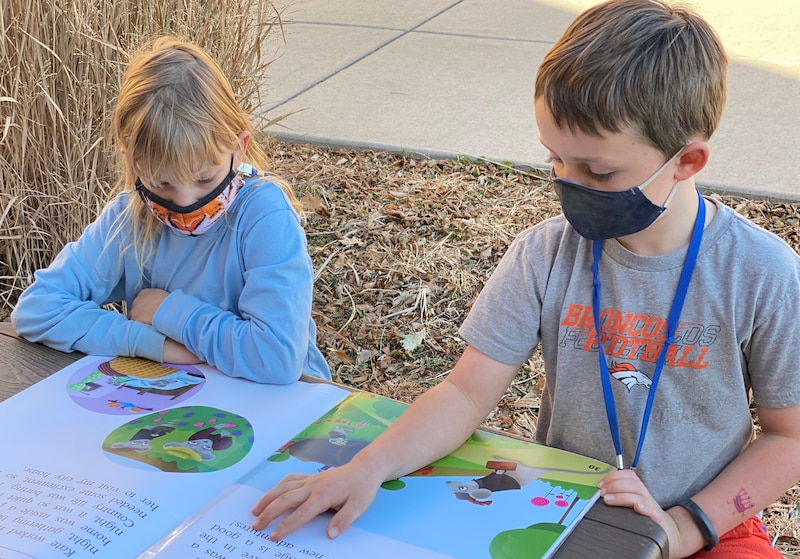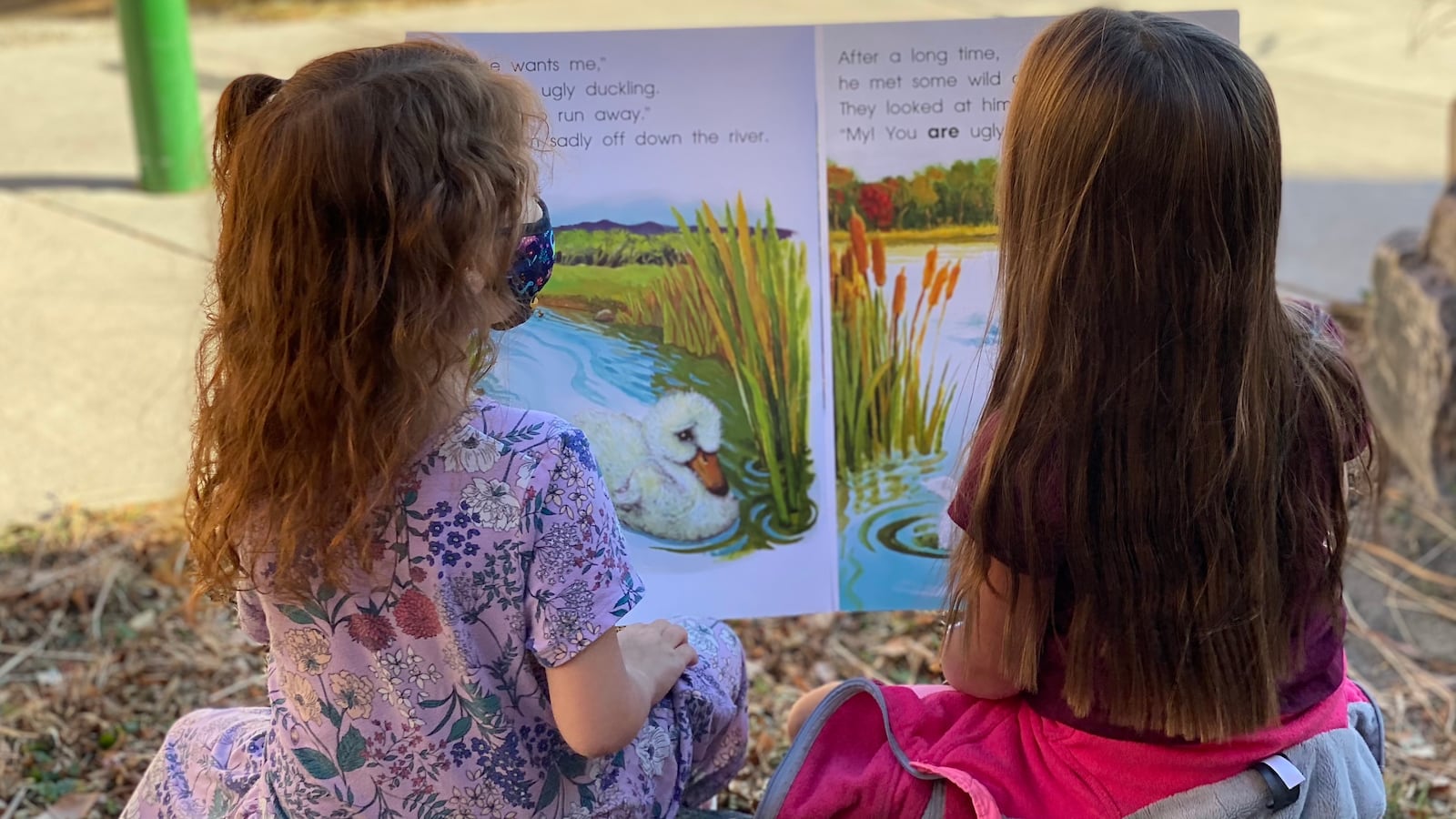Two-thirds of Denver schools use at least one reading curriculum in kindergarten through third grade that doesn’t meet new state requirements.
That means Colorado’s largest district may have to overhaul its reading curriculum to comply with state law — a sweeping task made more complicated by a court agreement on how Denver serves English learners.
By far the most common state-rejected curriculums in Denver schools are Benchmark Advance and Benchmark Adelante, its Spanish-language counterpart. More than half of elementary and K-8 schools use the 2018 version of one or both programs, with some students at more than 50 schools learning to read in Spanish then gradually transitioning to reading in English.
State reviews found the two Benchmark programs don’t align with research on how children learn to read, but district leaders say the products are among the few available options that satisfy its obligation to provide equivalent materials in English and Spanish.
“We’re legally required to have curriculum available in Spanish and English,” and it must offer comparable content and quality, said Nadia Madan Morrow, the district’s executive director for multicultural education.
That puts Denver in a uniquely thorny position — bound by a 2019 state law meant to boost Colorado’s dismal reading proficiency rates and a much older federal court agreement intended to ensure Denver’s English learners are well-served across all grades and subjects.
Floyd Cobb, the Colorado Department of Education’s executive director of teaching and learning, said by email that the department “will work directly with Denver Public Schools on this situation … DPS, like all districts, needs to use a scientifically or evidence-based programs in reading.”
A court monitor and plaintiffs in the case oversee Denver’s efforts to serve English learners based on criteria spelled out in a consent decree. Meanwhile, the state’s plan for rooting out poor reading curriculum is less concrete, with no set deadline for schools to replace programs the state has rejected.
Still, state officials have warned that districts could face lower state accreditation ratings if they don’t make a good-faith effort to comply with the new curriculum rule.
Some teachers say it’s beyond time for Benchmark to go. Troy Hubbell, a former elementary special education teacher at Denver’s Kunsmiller Creative Arts Academy, said many of his students came to him years behind in reading not because they had severe learning disabilities, but because Benchmark Advance didn’t properly cover reading basics like phonics and phonological awareness — the ability to hear and manipulate sounds in spoken language.
“Nearly every kid I saw had tremendous holes in both those areas,” he said.
What English learners need
But Madan Morrow said the state’s focus on reading curriculum backed by science doesn’t adequately consider the needs of English learners. In Denver, that’s a lot of students — about 29,000 or about one-third of the student body. Most of them speak Spanish as their first language.

“I’m not trying to say science of reading research is bad, but it wasn’t conducted on multilingual learners,” Madan Morrow said.
The “science of reading” refers to a large body of research on how children learn to read. One key finding is that explicit, systematic phonics helps build skilled readers. In other words, teachers must directly and methodically teach children the connection between letter combinations and sounds. Experts also agree that phonics instruction on its own isn’t enough.
But some fear that other critical elements for students learning English, like comprehension skills and vocabulary building, are being neglected.
Kathy Escamilla, an education professor at the University of Colorado Boulder and a plaintiff in the English learner case, said “it’s not enough to take a monolingual view of reading instruction, apply it wholesale without considering unique needs and strengths of second-language learners and then expect to have equal outcomes.”
She’s also concerned about how few Spanish programs have made the state’s approved list. Currently, the list includes just two Spanish core programs — Maravillas and Arriba la Lectura — compared with 10 English-language programs. Reviews of three other Spanish-language core reading programs are delayed.
“People at the state don’t know that they’re inadvertently undermining the ability of districts to implement solid bilingual programs, and that’s a shame,” Escamilla said.
Prioritizing reading in a pandemic
While most educators agree that well-trained teachers are the most critical part of the reading equation, they say high-quality curriculum can help. A 2019 law meant to strengthen the state’s 2012 reading law — the READ Act — seeks to use both levers to get more kids reading at grade level.
In the 92,000-student Denver district, only 39% of third-graders met state standards on Colorado’s 2019 literacy test, which includes reading and writing. That’s a bit lower than the state average of 41%, though Denver beat the state average on a measure that reflects student growth from year to year. In addition, Denver’s English learners do better on standardized literacy tests than do their peers around the state.
Krista Spurgin, executive director of the education advocacy group Stand For Children, said she wants to see bold leadership from the state education department as well as local leaders on reading curriculum oversight.
“There’s an opportunity for the Denver school board, I think all school boards … to dig in and understand how their READ Act dollars are being spent,” she said. ”If they’re not seeing results now on what they’re using, now would be a good time to shift.”
She said districts should also allocate funding for teacher training and support after curriculum switches.
Each year, Colorado districts receive a chunk of state money earmarked to help struggling readers. Last year, Denver got about $2.7 million. That amount isn’t enough for an across-the-board curriculum purchase in such a large district, but could defray the costs.
“The other thing I would say is yeah, we’re in a pandemic, we’re in a crisis,” Spurgin said. “So, let’s budget our priorities, and if kids reading isn’t a priority, then we are all misaligned to what we’re supposed to be doing.”
Local control landscape
Denver district officials and charter school leaders report using dozens of different core reading programs in their schools — a level of variation found in other large Colorado districts that emphasize school autonomy, including neighboring Jeffco.
Like Benchmark Advance and Adelante, the EL Education program is used in a majority of Denver schools, most often starting in third grade. Although the curriculum does not come in a Spanish version, Denver has produced Spanish materials that match up.
Sarah Tilton, a literacy intervention teacher and last year a third grade teacher at the elementary school Trevista at Horace Mann, said she likes using EL Education, in part for its high-quality books, and said the district has done a good job providing well-researched corresponding Spanish materials.
The problem for Denver — and other districts that use EL Education in third grade — is that the state approved the program only for use in kindergarten through second grade, not third. State officials said districts using approved curriculum in non-approved grades will have to switch for those grades. It’s not clear if any flexibility will be allowed — or how the state will enforce the requirement.
State education officials say the department won’t create “a comprehensive plan for how to support” districts that need to make curriculum changes until after districts turn in school-by-school curriculum lists on April 15.
More than a dozen Denver schools, including nine charter schools, use a well-regarded curriculum approved for all K-3 grades called Core Knowledge Language Arts. Like EL Education, experts praise Core Knowledge for its emphasis on building content knowledge, an important element for all children, but especially English learners and children who come from low-income families.
Other fully approved core curriculums used in some Denver schools include Wonders, its Spanish-language counterpart, Maravillas, and Open Court Reading.
More than a dozen Denver schools use state-rejected programs besides Benchmark, including one commonly called Lucy Calkins and a Colorado-grown early childhood curriculum called Tools of the Mind.
In addition to the state’s eventual monitoring of reading curriculum in districts statewide, Denver faces separate intermittent evaluations to determine if its English and Spanish materials are comparable.
In 2018, the court monitor in the English learner case praised the district’s effort to ensure parity, including in elementary reading materials. Currently, a group of plaintiffs in the case — the Congress of Hispanic Educators — is conducting a full curriculum audit. Escamilla, who is leading the audit, said the group will likely release findings on elementary curriculum in January.
How teachers see Benchmark
Opinions about Benchmark Advance and Adelante range widely. Some teachers say they like many of the programs’ components and note that the district has beefed up weak spots by developing additional reading lessons and materials in-house. Others say some components of the programs aren’t backed by science, don’t cover fundamentals thoroughly, and include books that one teacher described as “cartoony, non-genuine factory literature.”
“I don’t love it,” said Valdez Elementary teacher Jennifer Wiltse, of Benchmark Advance.
Formerly a reading intervention teacher who mainly used special programs targeting struggling readers, this year Wiltse is teaching first grade.
“I’m somewhat grateful that I have it because otherwise I’d be trying to invent it,” she said. At the same time, “it jumps around a lot and is not cohesive.”

Hubbell, who’s now a special education teacher in the Adams 12 district, said while many of his Denver students made up a lot of ground with the help of the highly structured phonics-heavy intervention program he used, they’d already missed years of grade-level reading and vocabulary.
“I got kids that never should have needed me who will probably never catch up, and I defy anyone to look me in the face and say that’s OK,” he said.
Some teachers are satisfied with Benchmark and worry about the cost and disruption of switching to something new.
Lisa Williams, who teaches first grade remotely to Spanish-speaking students from five Southwest Denver schools, said she thinks the Benchmark materials coordinate well and give students lots of opportunities to see and practice new words and skills. She agreed that the program’s books aren’t always the best, but said the district’s curriculum team has added high-quality options in supplemental lessons.
Williams said she doesn’t want the district to switch away from Benchmark.
“I feel like we’ve done so much jumping around as it is,” she said.
The new version of Benchmark
Last year, Benchmark Education submitted its latest version of Advance — the 2021 edition — for review in Colorado. The new version had undergone major revisions from the 2018 version, with Wiley Blevins, a phonics expert and author, leading the development of its foundational skills components.
In April, state reviewers rejected the 2021 version of Benchmark Advance, but after the company submitted clarifications in several areas, the state approved it in June for kindergarten through second grade. Company officials say the 2021 version includes enhanced explicit phonics, daily phonics intervention options, and new trade books — the kind of books found in libraries and bookstores.
A national curriculum reviewer, EdReports, concluded that the 2018 and 2021 versions of Benchmark Advance “partially meet expectations,” with both versions earning mediocre scores for building student knowledge. EdReports doesn’t review Spanish-language curriculum.
Benchmark doesn’t plan to submit its revised version of Adelante — the 2022 edition — for approval in Colorado until the state’s next reading curriculum review cycle. That will start next fall and finish in spring 2022. That means even if Denver bought the approved 2021 edition of Benchmark Advance, there’s currently no approved Spanish version to go with it.
Caitlin Mohl, who teaches first grade English learners at Swansea Elementary School, was on the district’s curriculum review committee when Benchmark Advance and Adelante were adopted in 2016.
She said the committee considered a handful of curriculums at the time and Benchmark checked the most boxes. It had fairly solid coverage of foundational skills, alignment to state standards, and English-Spanish parity.
After looking at the state’s evaluation of Benchmark Adelante, Mohl argued that some criteria and reviewer comments don’t make sense for Spanish-language reading curriculums since Spanish sounds and spelling are more consistent than in English. State officials used the same criteria for all curriculums reviews.
Mohl, like many educators, also said the dearth of Spanish materials on the market is a big problem. During the district’s review process, she said the publisher of one reading program said it didn’t have anything available in Spanish, but planned to unveil something soon.
“You just can’t take that kind of risk,” she said.
This story was produced with support from the Education Writers Association Reporting Fellowship program.
Search for a Denver school below to find out what core reading curriculum it uses in kindergarten through third grade and whether that program has been approved by the state. A core program is a comprehensive instructional program designed to teach all children in a classroom.
Don’t see a searchable table below? View the story here.
This story was produced with support from the Education Writers Association Reporting Fellowship program.
[Note: The table was updated to reflect that 95% Group is approved as a supplemental or intervention program.]

